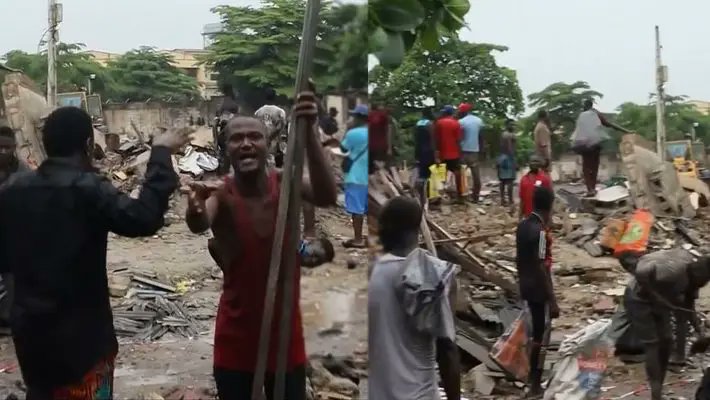
Lagos Mechanics Count Their Losses as Government Demolishes Agidingbi Auto Market

The once-bustling automobile market at First Gate, Agidingbi, Ikeja, has been reduced to rubble, and with it, the livelihoods of hundreds of mechanics and artisans were shattered on Friday morning when operatives of the Lagos State Government Taskforce moved in with bulldozers and heavily armed security personnel. What used to be a hive of mechanical activity—a place where engines roared, tools clanked, and breadwinners toiled—now lies flattened, covered in dust and debris.
As early as 6:30 a.m., taskforce trucks rolled into the location under the watch of stern-faced security agents. Within minutes, demolition equipment began tearing down sheds, workshops, and makeshift offices that had stood for decades. By noon, the area was unrecognizable. Those who arrived late could only watch in disbelief as the structures they relied on for survival were turned to ashes. For many, there was no prior warning, no compensation, and no relocation plan—only heartbreak and a growing sense of abandonment.
Eyewitnesses and victims alike expressed outrage and sorrow over the demolition, lamenting not just the loss of property but the sudden erasure of a thriving community built over years of hard work. "I have worked here for 17 years," said Samuel Okonkwo, a visibly distraught auto electrician whose workshop was destroyed. "My entire life is here. This is where I trained boys, repaired cars, and earned money to feed my family. Now, I have nothing. They didn't even give us time to remove our tools."
The story is similar for Ibrahim Musa, a father of four and head mechanic whose small garage serviced over 20 vehicles weekly. Standing amid the remains of his once-busy shop, he clutched a rusty spanner as though hoping to restart a broken past. “They came like thieves in the night. No notice, no meeting, nothing. Just bulldozers and guns. How can a government treat its people like this?” he asked.
The Agidingbi auto market has long served as a vital ecosystem in Lagos' commercial nerve center. Known for its specialized mechanics, spare parts dealers, and panel beaters, it attracted customers from across the state. Many of the artisans had spent years building client trust and investing in their trade, some even acquiring the space through community arrangements and local levies. The demolition, however, has left them scrambling for answers and uncertain futures.
In response to mounting criticism, a representative of the Lagos State Government who preferred to remain anonymous stated that the demolition was part of an “urban renewal project” aimed at restoring order and reclaiming public land. According to him, the area had been earmarked for development, and the traders had been “squatting illegally.” However, he could not confirm if any formal notice was served prior to the operation.
This claim contradicts the accounts of several market occupants who insist they were caught off guard. “We were not squatters. We paid dues to local authorities. We even held meetings with some government officials last year who promised us that any development would involve us,” said Chidi Eze, a spare parts dealer who lost over N3 million worth of inventory during the demolition. “Now they’re saying we’re illegal? That’s betrayal.”
Many affected workers expressed concern over the lack of a relocation plan or support system. With the economy already stretched thin and unemployment at alarming levels, they fear that the demolition will push more young men into crime and deepen poverty. “They expect us to disappear or go back to our villages,” said Adewale Ojo, a welder. “But we are Lagosians too. We pay taxes. We vote. Yet they treat us like pests.”
Civil society groups have also weighed in, condemning the demolition as inhumane and poorly timed. In a statement issued Friday evening, the Centre for Grassroots Economic Empowerment described the action as “a direct assault on the urban poor” and called on the government to provide compensation and immediate alternatives for those displaced. “What is development if it crushes the lives of the very people it claims to uplift?” the statement read.
Human rights lawyer Festus Ogun also criticized the move, stating that any demolition exercise that fails to follow due process and offer compensation is illegal under Nigerian law. “The constitution protects the right to property and fair hearing. What happened in Agidingbi is not just a policy failure; it is a violation of rights,” he said in a televised interview.
Social media erupted in reaction, with many users sharing videos of the demolition and expressing outrage at what they called a heartless action by the government. Hashtags like #AgidingbiDemolition and #SaveLagosMechanics trended for hours as Nigerians called for accountability and transparency. Some users questioned why the government would demolish a functioning economic hub without first creating an alternative.
Meanwhile, families of affected workers now face a harsh reality. School fees, rent, feeding, and other basic needs have become immediate concerns for people who, just days ago, were financially stable. Several of the artisans have begun squatting in nearby areas, hoping to recover lost tools and plan their next move. A few have vowed to protest if no relief or dialogue is initiated within the coming days.
The Lagos State Government is yet to issue an official press statement regarding the demolition. However, sources close to the Ministry of Environment hint that more demolitions may occur in areas classified as “unapproved zones.” This has only heightened anxiety among informal workers who now fear their own locations may be next on the list.
For now, the dust of demolition still hangs in the air over Agidingbi, mixing with the frustration and despair of hundreds who once saw the place as home and hope. As bulldozers retreat and silence replaces the familiar hum of engines, one question remains: in the pursuit of modernization, who speaks for the ordinary people being buried under its wheels?


